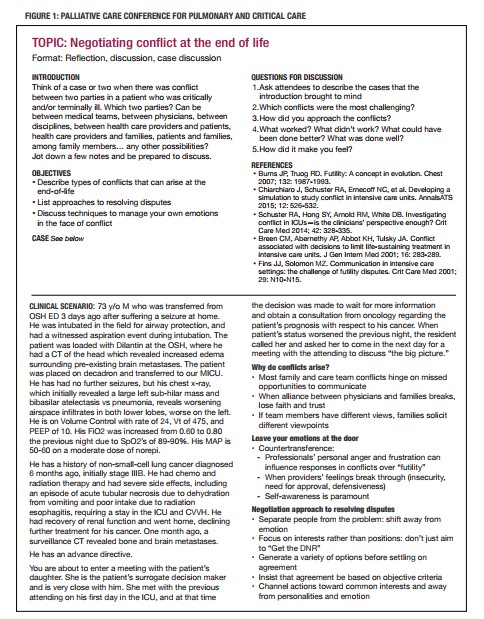Rush University Medical Center
Chicago, IL
Program Director: Betty Tran, MD
Type of Program: Pulmonary/Critical Care
BACKGROUND
Mortality in the intensive care unit (ICU) ranges from 5-40%. Palliative care (PC) curricula have been recommended for all critical care fellows, yet they are neither standard nor required in most pulmonary and critical care training programs. Research has shown that critical care fellows are inadequately trained in palliative and end-of-life care, and that implementation of a PC curriculum has a positive impact on fellows’ attitudes and knowledge. Important benefits to PC education include improving communication with patients and families and thus improving satisfaction, as well as decreasing burnout and improving job satisfaction. Despite cited benefits, such programs have proven difficult to sustain and maintain. PC education has been limited in Pulmonary and Critical Care (Pulm/ CC) Fellowship Programs and can be improved. Addition of a formal PC curriculum within a Pulm/ CC Fellowship has potential to improve patient care, family satisfaction, communication in the ICU, trainee perception of end-of-life care, trainee knowledge of PC, and to decrease burnout.
METHODS
A mandatory 2-week PC clinical rotation was introduced for second-year fellows, including a series of online self-study modules, 8-10 clinical days rotating on a hospital-based inpatient palliative care consult service with palliative care attending physicians, and 2 clinical days rotating on an independent inpatient hospice and palliative care unit. A monthly one hour PC Conference in the Division of Pulm/CC was initiated, with required attendance for fellows and optional attendance for faculty. The conference includes a time of bereavement and debriefing of difficult emotional cases, as well as an interactive educational discussion session relevant to both PC and Pulm/ CC. Fellows take an active role in preparing the monthly bereavement list. The educational session is facilitated by faculty in Pulmonary and Critical Care Medicine and/or Palliative Medicine, with occasional guest facilitators from various disciplines. Topics are selected to encompass a broad range of palliative care domains, including (1) patient and family communication; (2) pain and symptom management in those who are seriously ill or dying; (3) quality of life focus; (4) coordination of care; and (5) interdisciplinary team involvement.
RESULTS
In the three years since its inception, conference attendance remains high with at least 2/3 of fellows present at each meeting. Interest in topics for discussion varies. Qualitative feedback regarding the curriculum, both the clinical rotation as well as the conference, is positive. Fellows report benefiting from both the didactic aspect of the conference as well as the humanistic benefits of reflecting on mortalities and difficult cases. Topics for discussion continue to be refined and developed based on attendee feedback, with some topics repeated annually due to their importance and relevance, and some topics on a rotation schedule to be repeated every second or third year. A comprehensive curriculum guide with attendee handouts and leader guides that include relevant teaching pearls and literature references is being developed for dissemination.
DISCUSSION
PC is an important aspect of Pulm/CC fellowship training. It is feasible to implement a new PC curriculum for Pulm/CC fellows that includes a rotation and conferences. The curriculum continues to stimulate interest in PC issues and improve trainee morale among the Pulm/CC fellows. Maintenance of such a curriculum requires an educational champion for PC in Pulm/CC.




